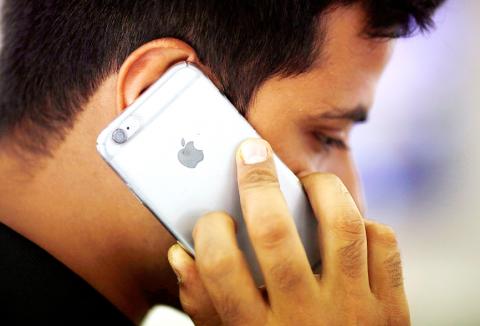Apple Inc on Thursday confirmed what some conspiracy theorists suspected, that it intentionally slows performance of older iPhones as batteries weaken from age.
The admission played into concerns that Apple was stealthily nudging iPhone users to upgrade to newer models by letting them think it was the handsets that needed replacing and not just a matter of getting new batteries.
“Our goal is to deliver the best experience for customers, which includes overall performance and prolonging the life of their devices,” an Apple spokesperson said in response to an Agence France-Presse inquiry.

Photo: Reuters
“Lithium-ion batteries become less capable of supplying peak current demands when in cold conditions, have a low battery charge or as they age over time, which can result in the device unexpectedly shutting down to protect its electronic components,” the spokesperson said.
Lithium-ion batteries are commonly used in mobile devices and charging capacity naturally wanes with use and time.
Meanwhile, smartphone operating software is perpetually improved with updates that typically increase appetites for electricity.
Last year, Apple introduced a feature to “smooth out” spikes in demand for power to prevent iPhone 6 models from shutting down due to the cold or weak batteries, the company said.
The feature, which slows performance to demand less power, has been extended to iPhone 7 handsets with the latest iOS operating software and will be added to other Apple products “in the future,” the spokesperson said.
People worried about performance could replace batteries, which Apple does for free for iPhones covered by warranty or for US$79 if that is not the case.
Rumors have persisted for years at tech news Web sites devoted to Apple products and among fans of the company’s products that iPhone performance was being intentionally slowed, perhaps to push users to buy newer models.

With an approval rating of just two percent, Peruvian President Dina Boluarte might be the world’s most unpopular leader, according to pollsters. Protests greeted her rise to power 29 months ago, and have marked her entire term — joined by assorted scandals, investigations, controversies and a surge in gang violence. The 63-year-old is the target of a dozen probes, including for her alleged failure to declare gifts of luxury jewels and watches, a scandal inevitably dubbed “Rolexgate.” She is also under the microscope for a two-week undeclared absence for nose surgery — which she insists was medical, not cosmetic — and is

CAUTIOUS RECOVERY: While the manufacturing sector returned to growth amid the US-China trade truce, firms remain wary as uncertainty clouds the outlook, the CIER said The local manufacturing sector returned to expansion last month, as the official purchasing managers’ index (PMI) rose 2.1 points to 51.0, driven by a temporary easing in US-China trade tensions, the Chung-Hua Institution for Economic Research (CIER, 中華經濟研究院) said yesterday. The PMI gauges the health of the manufacturing industry, with readings above 50 indicating expansion and those below 50 signaling contraction. “Firms are not as pessimistic as they were in April, but they remain far from optimistic,” CIER president Lien Hsien-ming (連賢明) said at a news conference. The full impact of US tariff decisions is unlikely to become clear until later this month

GROWING CONCERN: Some senior Trump administration officials opposed the UAE expansion over fears that another TSMC project could jeopardize its US investment Taiwan Semiconductor Manufacturing Co (TSMC, 台積電) is evaluating building an advanced production facility in the United Arab Emirates (UAE) and has discussed the possibility with officials in US President Donald Trump’s administration, people familiar with the matter said, in a potentially major bet on the Middle East that would only come to fruition with Washington’s approval. The company has had multiple meetings in the past few months with US Special Envoy to the Middle East Steve Witkoff and officials from MGX, an influential investment vehicle overseen by the UAE president’s brother, the people said. The conversations are a continuation of talks that

CHIP DUTIES: TSMC said it voiced its concerns to Washington about tariffs, telling the US commerce department that it wants ‘fair treatment’ to protect its competitiveness Taiwan Semiconductor Manufacturing Co (TSMC, 台積電) yesterday reiterated robust business prospects for this year as strong artificial intelligence (AI) chip demand from Nvidia Corp and other customers would absorb the impacts of US tariffs. “The impact of tariffs would be indirect, as the custom tax is the importers’ responsibility, not the exporters,” TSMC chairman and chief executive officer C.C. Wei (魏哲家) said at the chipmaker’s annual shareholders’ meeting in Hsinchu City. TSMC’s business could be affected if people become reluctant to buy electronics due to inflated prices, Wei said. In addition, the chipmaker has voiced its concern to the US Department of Commerce